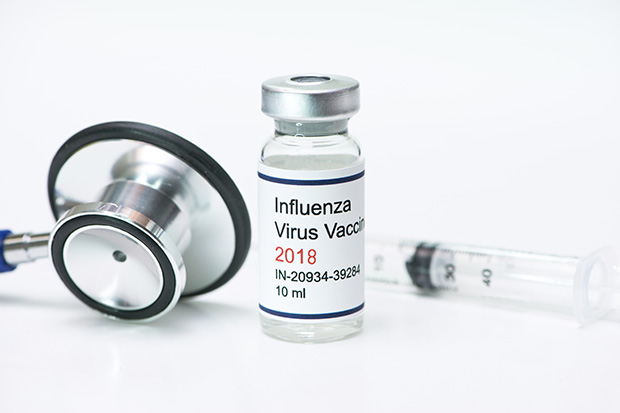Getting the point: What Canadians need to understand about the flu shot
University’s public health issue research expert Dr. Wally Bartfay clears up misconceptions about the influenza vaccine
November 20, 2018

One thing we can all probably agree on: regardless of age, no one really likes getting a needle. But it’s that time of year again. People around you may be coughing or sneezing. It’s time to get your annual flu shot.
Trouble is, many Canadians apparently have a problem with getting the flu shot. Whatever the reasons may be, avoidance of the flu shot poses a mounting problem for Canadian health care.
“Last year, fewer than one in three Canadians were immunized against the flu,” says Wally Bartfay, PhD, RN, a public and population health researcher with the University of Ontario Institute of Technology’s Faculty of Health Sciences. “Canadians need to understand that the various strains of the flu that emerge each year make it more than a local or regional concern. In today’s world of almost unlimited air travel, any virus can travel to any other spot on the planet in less than 36 hours. Flu immunization is a global health issue.”
This year, powerful and different flu strains originating in Michigan, Australia and Hong Kong are cause for concern.
Because some patients cannot be immunized against the flu (e.g. recent organ transplant recipients, chemotherapy patients, those who are HIV-positive), they rely on the concept of ‘herd immunity’ for protection: they need everyone else to get the flu shot.
“Last year’s compliance rate of 32 per cent is dangerously low when public health officials set a target of 80 per cent,” says Dr. Bartfay. “The shot isn’t just about protecting yourself from the flu. It’s also about protecting everyone else around you. As flu strains mutate, there’s always the possibility for pandemics like avian flu, swine flu, or something like what Toronto went through in 2003 with SARS. We all have an obligation to protect ourselves.”
Influenza facts
- Flu can be life-threatening: each year 3,500 Canadians die of vaccine-preventable flu.
- Each year there are more than 12,000 lab-confirmed cases of influenza in Canada requiring hospitalization (not including cases treated at home).
- In 2017-2018, the number of lab-confirmed flu cases spiked to more than 15,500.
- Most cases of flu last for a week to 10 days. The economic loss through work absences and hospitalizations is more than $1 billion annually.
- Flu season runs from November through April.
“Flu prevention measures not only save lives, they are very cost-effective from a public health perspective,” says Dr. Bartfay. “We know that for every dollar spent on vaccinations, there is a $16 return on investment (1,500 per cent) in terms of savings for the health-care system. That’s why the shots are free to patients. Public education also helps overcome the many inexplicable and frustrating vaccine and immunization myths that have emerged in pop culture. People should not be heeding the advice of misinformed celebrities over the knowledge of health-care professionals.”
Myths about the flu shot
- You can contract the flu from the flu shot (false: the vaccine only contains proteins from the virus, not the actual live virus).
- Flu shots contain mercury (false: one preservative in the vaccine called thimerosal breaks down into ethylmercury once inside the body, but it is not the form of the element that causes mercury toxicity).
- Flu shots are ineffective (false: while no vaccine is 100 per cent effective, immunization can prevent or lessen the impact of influenza infection).
Dr. Bartfay uses the analogy of bike helmets when it comes to the effectiveness of the flu shot.
“Certainly no vaccine is perfect in terms of prevention, but the flu shot provides substantial protection, especially in reducing the impact of any infection. Think of how a bike helmet offers substantial protection to cyclists against serious head injuries. The bike helmet may not be perfect either, but wearing it can prevent major health issues in the event of an accident.”
And to those who say getting the flu shot is inconvenient or time-consuming?
“People are willing spend 10 or 15 minutes in line at the coffee shop every day. It’s not a huge burden to take a few moments to get a single flu shot. Think of it in the same way you might if you were taking a bit of time to donate blood: the time you take to get your shot may save your life, or someone else’s. Whether it’s at your doctor’s office, a pharmacy or a public clinic, you can get the flu shot easily. Plus, it’s free.”
Related links:
- Information regarding flu shot clinics offered by the Campus Health Centre
- Region of Durham Public Health Flu website
- Government of Ontario Flu Facts
Media contact
Bryan Oliver
Communications and Marketing
Ontario Tech University
905.721.8668 ext. 6709
289.928.3653
bryan.oliver@uoit.ca



